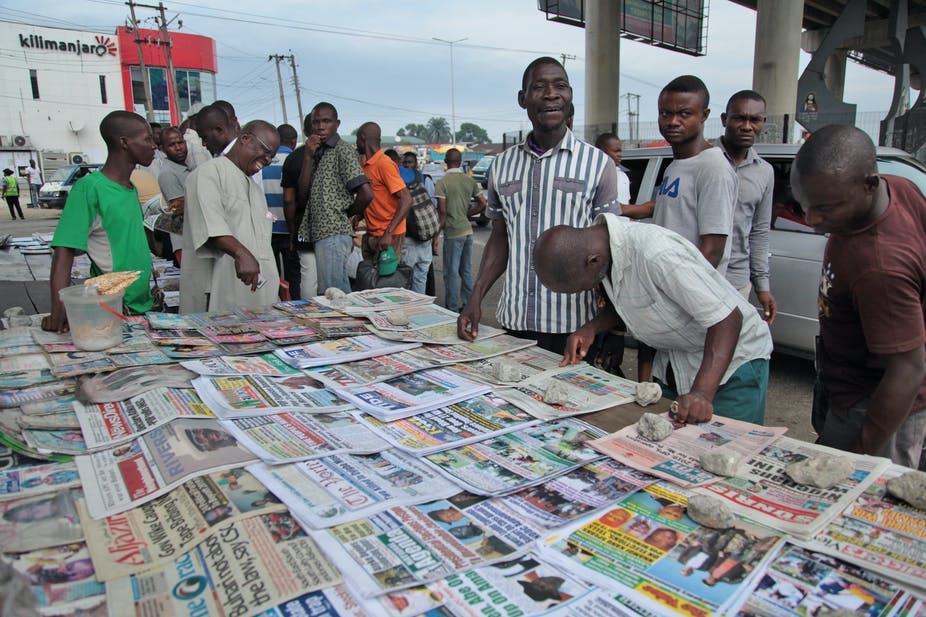(单词翻译:单击)
中英文本
Books and Aarts
文学与艺术
Journalism in Africa - Open letters
非洲的报章杂志——公开的信件
Last October young Nigerians took to the streets to protest against police brutality. At first “none of the traditional media companies were covering it,” recalls Wale Lawal. A few years earlier he had started the Republic, a quarterly magazine of ideas and analysis, and now his readers wanted to discuss the movement that was swelling around them. So he and his team in Lagos ran a series of online pieces on the protests, later collected in a special print edition. This kind of in-depth coverage of under-reported stories was “exactly what we were set up to do”.
去年10月,尼日利亚年轻人走上街头抗议警察的暴行。起初,“没有一家传统媒体公司对此进行报道,”威尔·劳瓦尔回忆道。几年前,他创办了《共和》,这是一本有关思想和分析的季刊,现在他的读者们想要讨论他们周围正在发酵的运动。因此,他和他在拉各斯的团队在网上发布了一系列关于抗议活动的文章,后来收录到期刊的一期特别版中。深度报道这些未被报道的故事“正是我们要做的”。

Mr Lawal says he hopes the Republic will one day become “a New York Times for Africa”. But in temperament it is more like the protest movement itself —youthful, tech-savvy and decentralised, its freelance writers touching on topics as diverse as modern slavery or the sexism of Fela Kuti, a revered musician. The publication is an example of the new intellectual spaces that have opened up in Africa over the past decade, from long-form journalism to literary magazines, in an efflorescence of political commentary, criticism and fiction.
拉瓦尔表示,他希望《共和》有朝一日能成为“非洲的纽约时报”。但在气质上,它更像抗议运动本身——年轻、精通科技、分散,它的自由撰稿人书写各种各样的话题,从现代奴隶制到受人尊敬的音乐家费拉·库提的性别歧视。在过去的十年里,在政治评论、批评和小说蓬勃发展的时期,从长篇新闻到文学杂志,这本出版物是非洲开辟新知识空间的一个例子。
African intellectual journals have an illustrious history. The independence era of the 1950s and 1960s produced titles such as Présence Africaine and Transition. “A good literary magazine is like a blind man’s stick,” wrote Rajat Neogy, the Ugandan founder of Transition; “it helps you feel the way.” He published work by luminaries including Chinua Achebe, Wole Soyinka, Ngugi wa Thiong’o and James Baldwin. But in 1968 he was arrested for sedition after running an article critical of Uganda’s government, a harbinger of the authoritarian cloud that would smother free expression in many African countries.
非洲知识期刊有着辉煌的历史。20世纪50、60年代的独立时期,出现了《Présence Africaine》、《Transition》等书刊。“一本好的文学杂志就像盲人的手杖,”乌干达的《Transition》创始人拉贾特·尼奥里写道,“它帮助你摸索前进的道路。”他出版了钦努阿·阿契贝、渥雷·索因卡、恩古吉和詹姆斯·鲍德温等名人的作品。但在1968年,他在发表了一篇批评乌干达政府的文章后,因煽动叛乱而被捕,这预示着独裁的阴云将扼杀许多非洲国家的自由言论。
By 2000 speech was again becoming freer, and the new century saw the birth of publications such as Chimurenga, a literary magazine that took its name from a Shona word for Zimbabwe’s liberation struggle. But it was on the internet that restraints really fell away. “For many African countries the digital space is the freest,” says John Githongo, a Kenyan anti-corruption campaigner and former writer for The Economist. In 2016 he was one of a group of Kenyans who founded the Elephant, an outspoken political website that had 3.2m views in 2020. (Online freedom can be fragile: Uganda’s government blocked the site during last year’s election campaign, after it covered massacres by the security forces, among other sensitive subjects.)
到了2000年,言论再次变得更加自由,新世纪见证了像《Chimurenga》这类出版物的诞生,文学杂志《Chimurenga》的名字来源于肖纳语,意思是津巴布韦解放斗争。但在互联网上,限制才真正消失了。“对许多非洲国家来说,数字空间是最自由的,”肯尼亚反腐败活动家、《经济学人》前撰稿人约翰·吉松戈说。2016年,他和一群肯尼亚人一起创建了“大象”,“大象”是一个言论犀利的政治网站,在2020年拥有320万的浏览量。(网络自由有时是脆弱的:乌干达政府在去年竞选期间封禁了该网站,此前该网站报道了安全部队制造的屠杀以及其他敏感话题。)
译文由可可原创,仅供学习交流使用,未经许可请勿转载。
词语解释
1.Last October young Nigerians took to the streets to protest against police brutality.
take to the streets 走上街头(游行,抗议)
eg. In the cities the young have taken to the streets only sporadically.
在城市中走上街头游行示威的青年也寥寥无几。
protest against 反对,对…提出抗议
eg. The campaign provided a channel for protest against the war.
这场运动是反对战争的一种方式。
2.This kind of in-depth coverage of under-reported stories was “exactly what we were set up to do”.
in-depth coverage 深度报道
eg. Renowned for its in-depth coverage and intellectual courage, The Atlantic has won more National Magazine Awards (industry equivalent of the Oscars) than any other monthly magazine.
由于其对事件的深入报道和理性的气魄,《大西洋》获得了比其他任何一本月刊都要多的“国家杂志奖”(相当于出版界的奥斯卡)。
set up to 为了...而成立;准备去做
eg. An independent body has been set up to investigate the affair.
已成立了一个独立机构调查这件事。
关注微信公众号【可可双语精读】获取更多双语学习资料。


